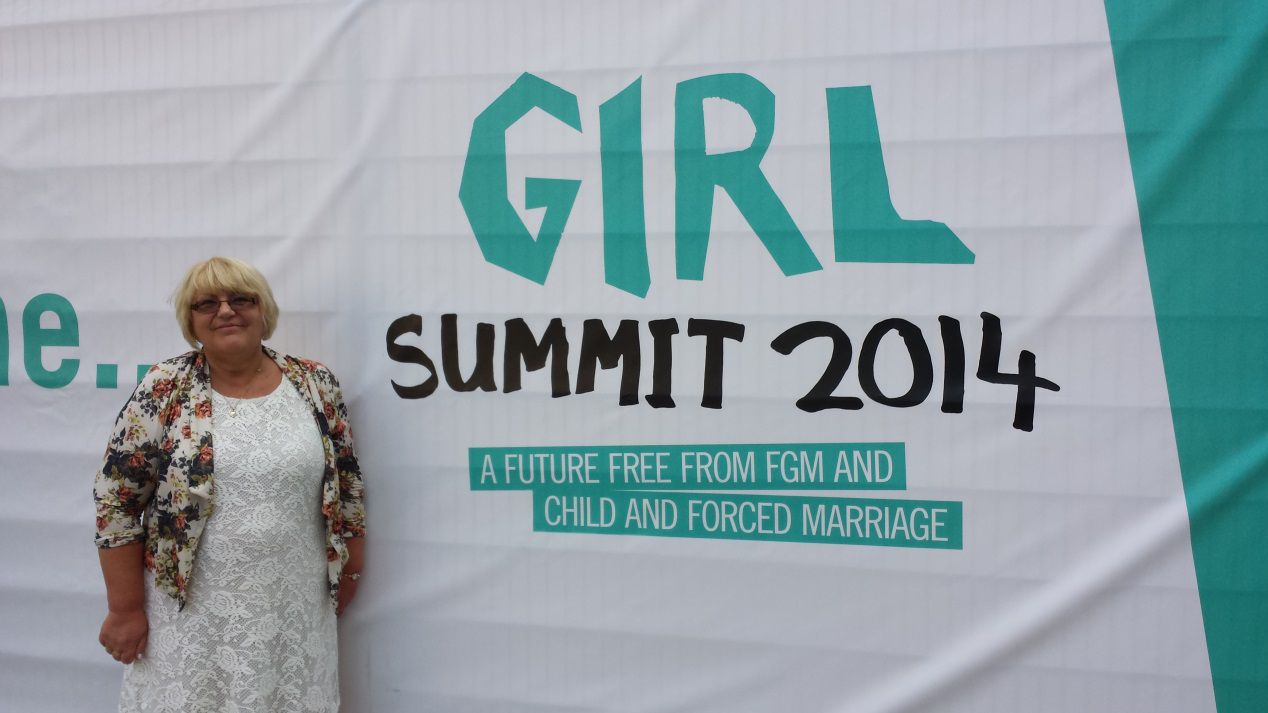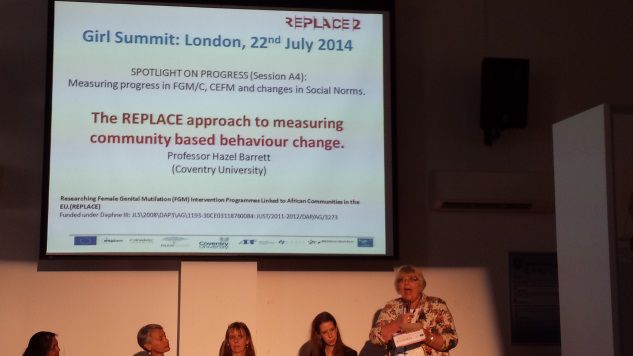
|
|
30th of May 2014 What is the Community Based Research Approach? It is the main methodological approach used by REPLACE 2 partners in order to undertake the focus group and interviews necessary to understand barriers against behaviour change in FGM. It challenges the power dynamics associated with traditional research as researchers are members from FGM practising communities, who are motivated to gather knowledge about individuals’ experiences and values. Community Based Researchers were trained on research methods and participated actively in the development of interview schedules and focus group topic lists. Spain (Gabinet) Both of the REPLACE 2 Community Based Researchers in Spain, Babucarr Tunkara and Dialla Diarra, shared positive views about their experience of working with members of the FGM affected community. They noted that the focus group discussions were very useful in increasing their knowledge about FGM, its effects, and the different positions regarding the maintenance or abandonment of this practice. Furthermore, already being a member of the community allowed them to uncover things that are not very well known and might have been difficult for an external researcher to uncover. One of the most prominent findings was men’s attitude towards FGM, generally defending it as an expression of their identity and culture that should not be abandoned, even though the majority of them have been living in Spain for many years. The Community Based Researchers indicate that focus group discussions are an effective means for breaking the taboo around FGM, because they enable women to feel free to speak about FGM and start acting against it. For instance, a women’s group proposed to organise some informative sessions about the consequences of FGM and its relation to religion. Looking forward, both researchers agree that it will be very useful to continue the work with the community in order to exchange further information and knowledge about FGM among its members. One essential thing is to create a sense of trust within the community so they can express themselves freely, first between mothers and daughters, and later between women and men. Italy (CESIE)Samrawit Gebrihet, the Community Based Researcher in Italy, stated that FGM is not a common topic discussed within the community. Even though she has good level of knowledge about the Ethiopian community and its dynamics both in Ethiopia and in Italy, she has never discussed FGM with her family as it is not a common practice in the urban area from where she comes from. As a result she has learnt many new things through this project. She pointed out the emotional aspect of the conversations she held with people from her community as the most pertinent experience that she takes with her from the project. Even though the Eritrean community did not seemed very concerned about this topic, as the researcher Tesfaldet Ghebreghiogis Abreha recognised, they easily understood the importance of the research and accepted to collaborate. The surprising fact was that, even if this is not an easy topic, many people in the community were really well informed and open to speak about it. The researcher felt satisfied with his work, as the collaboration with other community members has been a very important fact to him and he had no previous experience in such kind of work. Portugal (APF) Portugal (APF) Claire Bagile, a Community Based Researcher from Portugal highlighted the links between FGM and other topics like values, social hierarchy, education methodologies, role of women, and exercise of the powers, as an aspect that makes this experience very interesting and remarkable. She stressed that one of the key obstacle to ending FGM is that “the values and the rituals are so calcified in the community that the fact that they are harmful not jeopardises the practice”. She pointed out the engagement with the group as the most interesting thing of this experience, especially the feeling of intimacy that appeared during the focus groups, where women could talk among their peers without censorship. The effectiveness of the focus groups was also stressed by another researcher, Mariama Djaló, who stated that this method was very appropriate not only to collect information about FGM, but also to increase participants’ awareness about the issue, as they created an environment for women to freely discuss FGM without any fears. Therefore, it would be useful to continue organising this kind of meetings in order to reach more women. Wilson C?, a Guinean Bissauan community based researcher in Portugal, also found that the methodological approach which is based on a deep understanding of the community is really useful, as interactivity and proximity with the community are fundamental to understand the perceptions and meanings of members in order to design effective interventions to end FGM. He also indicated the need for the ability to deal with delicate situations concerning people sensitiveness in order to tackle FGM. The interaction with members of the FGM affected communities revealed a surprising fact, which is the ability of younger women to express themselves against FGM, which shows that they are ready for change. The challenge now lies in how to engage with older women and men, who are more reluctant to change, and to promote discussion among all members of the community. A last researcher, Abdulai Baldé described the experience as extraordinary. He stressed the difficulty in talking about FGM, especially with older men ("Homis Garandis") and some religious leaders (“Imams"); but in contrast, he realised that there is a huge majority of young people who want to fight against this practice, and they need the tools to be able to do it. Furthermore, he stated that the level on information and preparation to discuss FGM is in a very low stage, so it is important to promote the involvement of the community, and encourage them to discuss without any taboos. |
|
|
|
is a two year project being funded by the European Commission. This project follows the successful completion of REPLACE 1 in 2011. REPLACE 2 is the product of the cooperation of six European countries, UK (Coventry University and FORWARD UK), the Netherlands (FSAN), Italy (CESIE), Portugal (APF), Spain (Gabinet) and Belgium (Ghent University). REPLACE 2 will implement and evaluate the behavioural change and community-based Toolkit developed by REPLACE 1. Partners will work directly with FGM-affected communities in the EU to understand the barriers to behavioural change and therefore develop tailored interventions which community groups and NGOs can use in future efforts to bring about the end of FGM in the EU and beyond. |
|
|
|
|
|
Girl Summit 2014 |
|
||||||
|
|
On 22nd of July, the Girl Summit 2014 took place in London, bringing together several key figures and influential individuals, committed to ending FGM and early forced marriage. Professor Hazel Barret, from Coventry University, participated in this conference to present the REPLACE 2 approach to measuring community based behaviour change as part of the ‘Measuring progress in addressing FGM and CEFM, including changes in social norms’ session. She presented an index of community readiness to change, which divides the behaviour change in several phases, starting with a situation in which FGM is a social norm, and ending with a situation in which the social norm is ending FGM. The intermediate steps to reach this situation include a deeper knowledge about FGM within the community, which can mean a change on its attitudes towards this issue. In this regard, the attitudes of community leaders and influential peoples can be really meaningful. The change of attitudes would be a first step to start making concrete efforts to ending this practice. More information about the Summit on: https://www.girlsummit2014.org/Commitment/Show 
 Professor Hazel Barret at Girl Summit 2014. REPLACE 2 featured in The Guardian Professor Hazel Barret talks to The Guardian (UK) about the REPLACE 2 work towards tackling FGM. Watch the video to listen to professor Barrett explain the project in more detail: Keep updated about activities towards ending FGM REPLACE 2 project is a source of information for all those stakeholders willing to understand more about FGM in Europe and abroad. Our team updates constantly the website and social media where you can find articles regarding partners’ work towards ending FGM, other interesting reports, research articles, podcasts, conference information and many more: If you need any advice from the REPLACE 2 team please write to: |
|
|
|||||
|
(REPLACE 2 Project Number:
JUST/2011-2012/DAP/AG) |
||||||||
